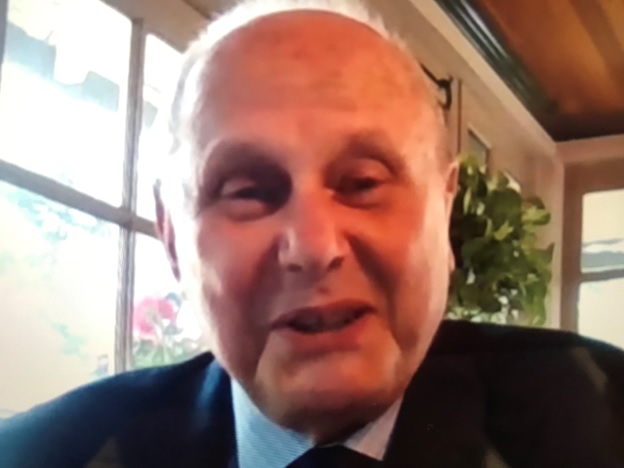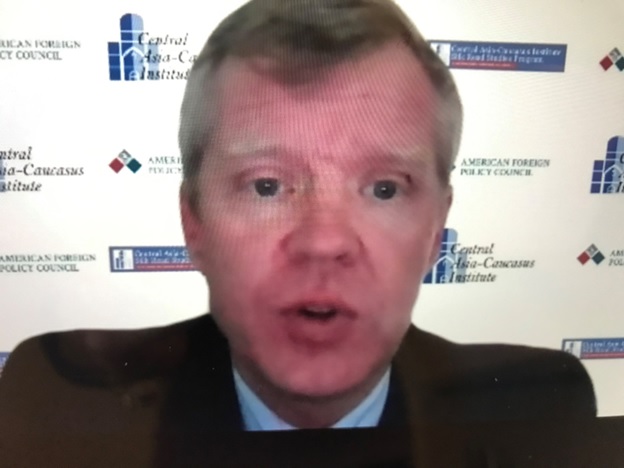
Dr S. Frederick Starr

Dr Svante Cornell
Central Asia-Caucasus Institute Experts Explore Kazakhstan Crisis
By Elaine Pasquini

Washington: Over the past year, Central Asia has experienced an abundance of significant changes, including the US withdrawal of forces in Afghanistan, street protests in Kazakhstan over increased fuel prices and income inequality, along with Russia’s war against Ukraine.
Bordering China, Iran and Afghanistan makes the five Central Asian states – Kyrgyzstan, Uzbekistan, Turkmenistan, Tajikistan and especially Kazakhstan, with its 7,644-kilometre border with Russia – of extreme geopolitical importance.
Dr Svante Cornell, director of the Central Asia-Caucasus Institute at the American Foreign Policy Council, and its chairman Dr S. Frederick Starr, discussed these issues before a well-attended virtual audience on May 5.
In early January, the Kazakhstan government was trying to bring fuel costs in line with the market, but raising the price in one huge jump propelled tens of thousands of people into the streets, evolving into a general critique of corruption in the government, Cornell said.
As the mainly peaceful protests in the west of the country spread eastward to the capital of Almaty, violence broke out threatening state institutions. These actions spurred Kazakhstan President Kassym-Jomart Tokayev to turn to the Russian-led CSTO (Collective Security Treaty Organization) for assistance to stabilize the situation, although he undoubtedly would have preferred to not have had to make that decision, Cornel noted.
From Moscow’s perspective, destabilization in Kazakhstan could have “exacerbated the unrest in the country and, at a time when Russia was fully focused on its upcoming invasion of Ukraine, would have been a strong irritant to its plans, not a part of its plans,” he added.
Cornell related that President Tokayev has acknowledged that the root cause of these protests is “understandable public dissatisfaction, which has been mounting for quite some time about inequalities and mismanagement and corruption.”
The dissatisfaction throughout the country “mirrored a bifurcation between well-educated, liberal urban elites…and a much larger, less-educated segment of the population that is much more nationalistic, less liberal in inclination,” Cornell said. “And that was why President Tokayev was furiously pushing economic and political reforms to maintain the stability of the country and the continuity of the political system.”
One reform, Starr suggested, could be strengthening state institutions at the municipal level, giving local governors more autonomy and responsibility.
Economically, Kazakhstan is seeing the effects of the Ukraine war and of Western-imposed sanctions which will hit its population through currency depreciation and loss of trade opportunities, Cornell said.
The deteriorating security situation around the region has been a major feature of Central Asian politics the last couple of years, which has strengthened regional cooperation among the leaders, Cornell stated. The Ukraine war could further increase the resolve of Central Asians to bolster their own cooperation and stability by providing security from inside the region rather than from outside.
Central Asia will be looking for support from the outside, however, to balance any Russian demands, and the US and the EU can play a role by staying engaged in the region and backing the countries’ efforts to cooperate at the regional level, both experts pointed out. The top priority of the United States must be to appoint an experienced ambassador to Kazakhstan, Cornell insisted.
In addition, Cornell continued, is the need for the US and EU to find measures to alleviate the effect the sanctions imposed on Russia will have on Kazakhstan and the Central Asian region. “It is very important for the West not to be indifferent to the economic downturn that is beginning in the region for it is going to have an effect on both the stability and on any hope for serious reform,” he said.
Kazakhstan is engaged in a balancing act of trying to maintain trade relations with Russia – a country they are economically integrated with through the Eurasia Economic Union – while not violating Western sanctions imposed on its neighbor, Cornell said.
Starr questioned whether Kazakhstan’s January crisis, which caused the country and its leaders to focus on its own affairs, might jeopardize its relations with neighboring Central Asian countries, possibly increasing Uzbekistan’s leadership role in the region.
Cornell argued, however, that the January protests only temporarily weakened Kazakhstan and did not compromise the country’s ability to lead in Central Asia. “Kazakhstan appears to not have changed its foreign policy in any visible way…and I do not think there is any rivalry for leadership between Kazakhstan and Uzbekistan,” he said. The Central Asian countries will all continue to work together for the mutual benefit of the region, he predicted.
Starr posited that 1991 really didn’t end the Soviet Union, but brought in Soviet-like states, which were independent, while a continuity – more or less – still existed.
“This line of thinking leads some people today to say that what we are witnessing now in 2022 is finally the breakup of the Soviet Union, not only as a geopolitical entity but as a political philosophy,” Starr argued.
Cornell said the model that emerged across the former Soviet Union was “the merger of political and economic power,” which is no longer sustainable.
In both Kazakhstan and Uzbekistan, the leadership wants to reform the system, he continued, but “the end goal of what they want to achieve in terms of what they want to reform is not clear.”
If the United States and the European Union want to support stability in Central Asia, now is the time for the West to actively support the process of reform, not least through the concrete provision of expertise and assistance. “This type of engagement,” Cornell said, “is the only way that Western partners would have a strong platform to engage Kazakhstan on issues of their concern.”
(Elaine Pasquini is a freelance journalist. Her reports appear in the Washington Report on Middle East Affairs and Nuze.Ink.)

